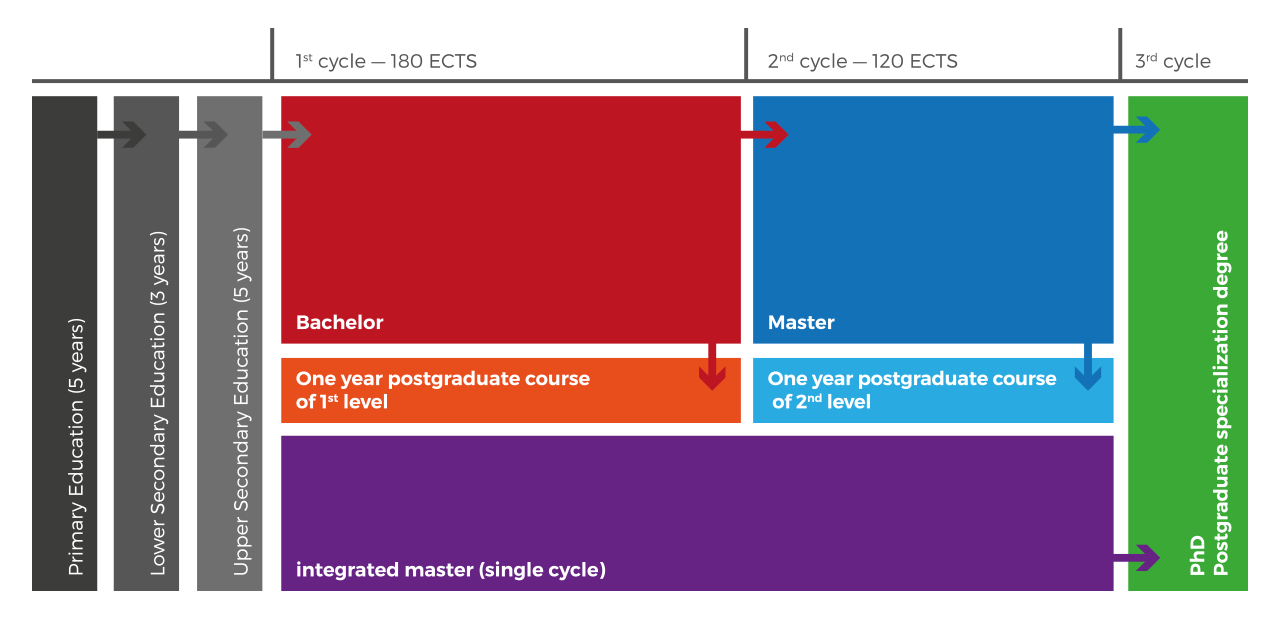DM 509/99 and DM 270/2004
Since 1999, Italian university studies have been reformed so as to meet the objectives of the "Bologna process". The university system is now organised in 3 cycles: the Laurea, the 1st cycle academic degree, grants access to the 2nd cycle, and the Laurea specialistica/magistrale, the main degree of the 2nd cycle, gives access to 3rd cycle courses awarding the Dottorato di ricerca. In addition to the three sequential degrees mentioned above, the system offers other programmes with their respective degrees.
First cycle. First cycle studies consist exclusively in Corsi di Laurea, aimed at guaranteeing students an adequate command of general scientific methods and contents as well as specific professional skills. The general access requirement is the school leaving qualification awarded on completion of 13 years of global schooling and after the relevant State examinations; also comparable foreign qualifications may be accepted. Admission to individual degree courses may be subject to specific course requirements. Laurea courses last 3 years. The Laurea (1st degree) is awarded to students who have earned 180 credits; the completion of a training period and the defence of a thesis may also be required. The Laurea grants access to competitions for the civil service, to regulated and non-regulated professions, and to 2nd cycle courses.
Second cycle. Second cycle studies include the following typologies:
A) Corsi di Laurea specialistica/Corsi di Laurea magistrale; they are aimed at providing students with an advanced level of education for the exercise of a highly qualified activity in specific areas. Access is usually by a Laurea or a comparable foreign degree; admission is subject to specific course requirements determined by individual universities; workload: 120 credits; length: 2 years. The awarding of the degree, Laurea specialistica/magistrale (2nd cycle degree of the “Bologna process”) is conditional on the defence of a thesis. The change of the name from Laurea specialistica into Laurea magistrale was decided in 2004. A limited number of 2nd cycle programmes (dentistry, human medicine, pharmacy, veterinari medicine, architecture, law), are defined Corsi di Laurea specialistica/magistrale a ciclo unico (one-block LS/LM courses); access is by the school leaving diploma or a comparable foreign qualification; admission is subject to selective entrance exams; each degree course is organised in just one-block of 5 years and 300 credits (only human medicine requires 6 years and 360 credits). All Lauree specialistiche/magistrali grant access to competitions for the civil service, to regulated and non-regulated professions, research doctorate programmes and all the other degree courses of the 3rd cycle.
B) Corsi di Master universitario di primo livello. They consist in advanced scientific courses or higher continuing education studies open to the holders of a Laurea or a comparable foreign degree; admission may be subject to additional conditions. Length: minimum 1 year; workload: 60 credits at least. The Master universitario di primo livello does not give access to the 3rd cycle.
Third cycle. Third cycle studies include the following typologies:
A) Corsi di Dottorato di Ricerca aim at training students for very advanced scientific research; they adopt innovative teaching methodologies, updated technologies, training periods abroad and supervised activities in specialized research centres. Admission requires a Laurea specialistica/magistrale (or a comparable foreign degree) and to pass a specific competition; studies last a minimum of 3 years; the doctoral student must work out an original dissertation to be defended in the final examination.
B) Corsi di specializzazione are devised to provide students with knowledge and abilities as requested in the practice of highly qualified professions; they mainly concern medical, clinical and surgical specialities. Admission requires a Laurea specialistica/magistrale (or a comparable foreign degree) and the passing of a competitive examination; course length varies in relation to subject fields. The final degree, Diploma di specializzazione, gives the right to the title as Specialista.
C) Corsi di Master universitario di secondo livello consist in advanced scientific courses or higher continuing education studies, open to the holders of an LS or a comparable foreign degree. Length: minimum 1 year; workload: 60 credits at least.
Credits: degree courses are usually structured in credits. A university credit generally corresponds to 25 hours of global work per student, time for personal study included. The average workload of a full time student is conventionally fixed at 60 credits per year.
Classes of degree courses: all degree courses sharing educational objectives and teaching-learning activities are organised in groups called classi. The content of individual degree courses is autonomously determined by universities; however, when establishing a degree course, individual institutions have to adopt some general requirements fixed at national level. Degrees belonging to the same class have the same legal validity.
Academic titles: the Laurea confers the title "Dottore", the Laurea specialistica/magistrale that of Dottore magistrale, the Dottorato di ricerca that of "Dottore di ricerca".
Joint degrees: Italian universities may establish degree courses in cooperation with foreign partner universities; on completion of integrated curricula joint or double/multiple degrees are awarded.




